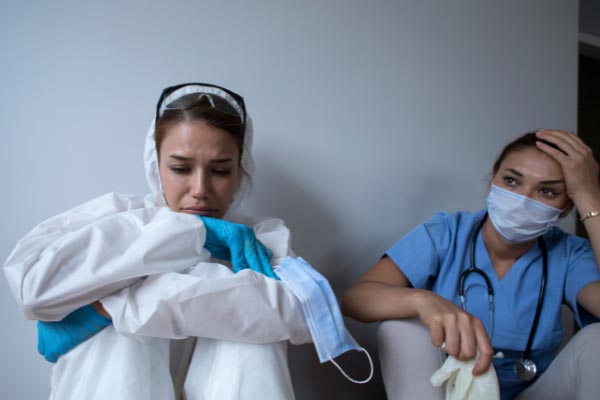In December of 2019, China announced it had discovered several pneumonia cases in Wuhan. In January 2020, the first American case was discovered in the United States, and President Trump declared a public health emergency. In February of 2020, the first death from Covid-19 occurred in the US. At the beginning of March 2020, a national emergency was declared, and lockdowns started occurring by the end of March. People were forced to stay in their homes, and all non-essential businesses were closed. A lot of people lost their jobs at this point. Then we are hit with mask mandates, social distancing, and more and more virus outbreaks and deaths. The toll this has taken on people’s mental health, and those struggling with addiction have been morbid and very visible.
Effects of the Coronavirus on the Opioid Epidemic
More than 2 million people in the United States struggle with opioid use. Since the Coronavirus hit, it has gotten considerably worse. To cope with the stress of the pandemic, more and more people have been self-medicating with drugs and alcohol. Treatment programs are seeing an increase of people coming in that have a year or less of problematic use, whereas, before that, individuals would have a history of 10 to 12 years of use. It is believed that fentanyl-tainted drugs during the Covid pandemic may have contributed to this increase. There has also been a disruption in the way people receive addiction treatment. With places being closed, telehealth and Zoom sessions have become more popular. For some, this is a more convenient way to get treatment, but not everyone has access to virtual treatment platforms.
Effects of Covid-19 on Opioid Overdose Fatalities
Over the last 15 to 20 years, opioid overdoses have been increasing. However, from 2019 to 2020, there has been a 30% increase in fatalities from 70,000 to 93,000. More than 130 individuals in the US die from a drug overdose every day. In May of 2020, The National Institute of Environmental Health Services reported the following:
The Covid-19 Pandemic is Fueling the Opioid Crisis. Nearly half of Americans report that the coronavirus crisis negatively impacts their mental health. There has been a 1000% increase in emotional distress reported to emergency hotlines. Unlike Covid-19, there is no real-time national counting of opioid overdose deaths but, in the last two months, at least 30 states reported an increase in opioid fatalities since the pandemic. (NIH)
The Covid-19 pandemic disrupted the supply of illicit drugs causing many drugs to be cut with more deadly substances like fentanyl (fentanyl is a synthetic opioid that’s 100 times more powerful than morphine). Also, people who had relied on a traditional supply chain over the years may have had a disruption from people getting sick. This has caused many to seek new suppliers. More and more different street drugs are being laced with fentanyl, and people don’t always know what they are getting. There’s a good chance any heroin you get is going to be cut with fentanyl, and it could even be cut with other things. Due to the lack of in-person meetings and drug testing availability due to COVID-19, relapses have become more common, which has caused a spike in the number of opioid overdose fatalities.
Recovery From Opioid Abuse
Evoke Wellness at Cohasset offers evidence-based addiction treatment to cater to each patient’s individual needs. Our solution-focused treatment provides men, women, and families with integrated and comprehensive care to lead you on the road to long-lasting recovery. At Evoke Wellness at Cohasset, our primary goal is to make your treatment experience as comfortable as possible. So, if you are having issues with any substances, let us help you. Our specialists and professionals are highly qualified and supportive and will help you start today’s recovery journey. Recover today for a better tomorrow with help from Evoke Wellness at Cohasset.




